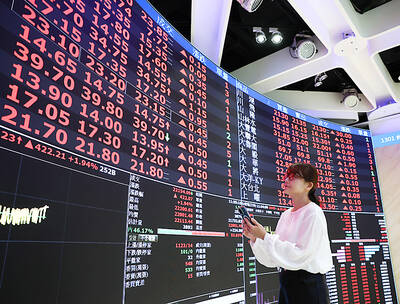Oracle Corp’s fiscal first-quarter revenue fell short of analysts’ projections, crimped by a slowdown in software license sales amid a shift to Web-delivered cloud products.
Revenue in the period that ended on Aug. 31 fell by 1.7 percent to US$8.45 billion, and profit before certain costs was US$0.53 per share, the Redwood City, California-based company said on Wednesday in a statement. Analysts on average had forecast sales of US$8.53 billion and profit of US$0.52, according to data compiled by Bloomberg.
Oracle is trying to navigate the transition to computing as a service over the Internet. While this move to the cloud has provided the company with opportunities to break into new markets, the shift has hurt its traditional business of selling licenses for software installed on corporate systems.
Growth has also been hurt by the strength of the US dollar, which has devalued revenue outside the US. International sales make up more than half of Oracle’s business. Had currency rates been constant, total revenue would have risen by 7 percent in the quarter, Oracle said.
“If licenses are going down and people are feeling that it’s not being made up for by billings on the cloud side, they’ll view that as maybe Oracle is growing in the cloud, but other cloud providers are growing at Oracle’s license expense,” said Kevin Buttigieg, an analyst at MKM Partners, who has a neutral rating on the stock.
Oracle shares dropped 4 percent to US$36.74 at the close on Thursday in New York, marking their biggest slide since June.
Net income in the first quarter declined to US$1.75 billion, or US$0.40 per share, from US$2.18 billion, or US$0.48, a year earlier.
Oracle co-CEO Safra Catz said that while the company feels good about its transition to the cloud, it is being prudent with its forecasts given world economic conditions.
In the current quarter, profit before certain items and assuming constant currency rates is be US$0.63 to US$0.66 per share, she said.
Revenue in the period that ends in November is expected to range from a decline of 2 percent to a gain of 1 percent compared with the same quarter a year earlier. That indicates sales of about US$9.4 billion to US$9.7 billion. Analysts had predicted profit of US$0.65 per share on revenue of US$9.54 billion, according to data compiled by Bloomberg.

UNCERTAINTIES: Exports surged 34.1% and private investment grew 7.03% to outpace expectations in the first half, although US tariffs could stall momentum The Chung-Hua Institution for Economic Research (CIER, 中華經濟研究院) yesterday raised its GDP growth forecast to 3.05 percent this year on a robust first-half performance, but warned that US tariff threats and external uncertainty could stall momentum in the second half of the year. “The first half proved exceptionally strong, allowing room for optimism,” CIER president Lien Hsien-ming (連賢明) said. “But the growth momentum may slow moving forward due to US tariffs.” The tariff threat poses definite downside risks, although the scale of the impact remains unclear given the unpredictability of US President Donald Trump’s policies, Lien said. Despite the headwinds, Taiwan is likely

READY TO BUY: Shortly after Nvidia announced the approval, Chinese firms scrambled to order the H20 GPUs, which the company must send to the US government for approval Nvidia Corp chief executive officer Jensen Huang (黃仁勳) late on Monday said the technology giant has won approval from US President Donald Trump’s administration to sell its advanced H20 graphics processing units (GPUs) used to develop artificial intelligence (AI) to China. The news came in a company blog post late on Monday and Huang also spoke about the coup on China’s state-run China Global Television Network in remarks shown on X. “The US government has assured Nvidia that licenses will be granted, and Nvidia hopes to start deliveries soon,” the post said. “Today, I’m announcing that the US government has approved for us

When Lika Megreladze was a child, life in her native western Georgian region of Guria revolved around tea. Her mother worked for decades as a scientist at the Soviet Union’s Institute of Tea and Subtropical Crops in the village of Anaseuli, Georgia, perfecting cultivation methods for a Georgian tea industry that supplied the bulk of the vast communist state’s brews. “When I was a child, this was only my mum’s workplace. Only later I realized that it was something big,” she said. Now, the institute lies abandoned. Yellowed papers are strewn around its decaying corridors, and a statue of Soviet founder Vladimir Lenin

The National Stabilization Fund (NSF, 國安基金) is to continue supporting local shares, as uncertainties in international politics and the economy could affect Taiwanese industries’ global deployment and corporate profits, as well as affect stock movement and investor confidence, the Ministry of Finance said in a statement yesterday. The NT$500 billion (US$17.1 billion) fund would remain active in the stock market as the US’ tariff measures have not yet been fully finalized, which would drive international capital flows and global supply chain restructuring, the ministry said after the a meeting of the fund’s steering committee. Along with ongoing geopolitical risks and an unfavorable